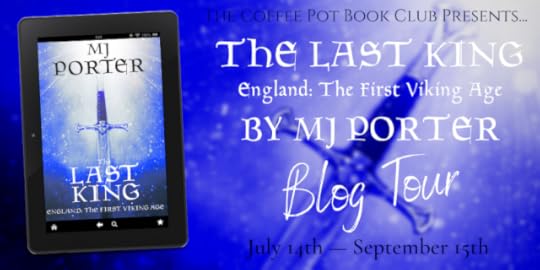Mary Anne Yarde's Blog: The Coffee Pot Book Club , page 78
August 13, 2020
Check out Miranda Malins' fabulous book — The Puritan Princess #HistoricalFiction #ThePuritanPrincess @MirandaMalins

The Puritan Princess
By Miranda Malins

1657.
The youngest daughter of Oliver Cromwell, eighteen-year-old Frances is finding her place at England's new centre of power.
Following the turmoil of Civil War, a fragile sense of stability has returned to the country. Her father has risen to the unprecedented position of Lord Protector of the Commonwealth, and Frances has found herself transported from her humble childhood home to the sumptuous palaces of Hampton Court and Whitehall, where she dreams of romance.
But after an assassination attempt on the Cromwell family, Frances realises the precarious danger of her position - and when her father is officially offered the crown, Frances' fate becomes a matter of diplomatic and dynastic importance.
Trapped in the web of court intrigue, Frances must make a choice. Allow herself to be a political pawn, or use her new status to take control - of her own future, and of her country's...
Excerpt
30 January 1661
We stand together, shoulder to shoulder, skirt to skirt, like a chain of paper dolls, come to see our father's execution.
Our hoods are pulled low over our faces although, in truth, few in the crowd would recognise us without our finery: we grace no coins, no medals or prints, and it is hardly likely any of them would have seen our portraits hanging, as they had, in the palaces of Whitehall and Hampton Court.
A frosted blast of wind whips around my cloak and sends the three nooses hanging from the gallows before me swinging as if the condemned men already danced their deaths. I stare at the gibbet in blank horror. It is a terrible thing, vast and three-sided like a triangle, designed, Father once told me, to hold twenty-four souls at a time.
‘Why did it have to be here?’ I speak sideways to my sisters. It is somehow worse, much worse, that it is happening at Tyburn, the dirty, eerie crossroads outside London where they hang common felons: highwaymen, thieves, murderers. ‘Parliament settled on treason as the crime, so it should have been the Tower.’
‘They wish to make a point, I suppose,’ Mary answers. ‘Some warning against men rising so far above their station.’
Fear creeps up my back like a spider and I feel it crawl along my arm and onto Mary’s. She shivers against me.
‘We shouldn’t have come,’ I say.
Mary stiffens. ‘We were right to come, Frances. Father would want us to be here; we were his soldiers too.’
Her words conjure images of the russet-coated Ironsides of the old days and, as I watch them march through the air, I am surprised again by the resolve Mary has shown in these past days; it used to be me who was the brave one.
‘We are here for Henry too,’ Bridget says quietly on my other side, her voice breaking over his name.
And that is when we hear them coming. A slow drumbeat parts the crowds and a dragging, catching sound behind it takes me back instantly to my early childhood when the boys drove the ploughs up and down the marshy fields outside Ely. But this is no plough. I know, without turning, that it is a hurdle, a great gnarled gate on which the horses have drawn the prisoners all the way along Holborn; a strange route to take from Westminster Abbey but, once again, symbolic – a final pretence that the men had come not from the sanctified chapel of kings but from Newgate prison, as most come to Tyburn.
The crowd begins to swell forward, nudging us closer to the scaffold. I smile in the sudden memory of what my brother-in-law Charles had reported Father saying to General Lambert, the day their great army marched north to fight the Scots. There, upon Lambert remarking on the cheering, massing throng waving and wishing them success, Father had quipped that the crowd would be as noisy to see him hang.
How right he was.
But as I peer from beneath my hood at the faces around me, I realise that Father was only partly right. As many are here to see him hanged, it is true, but they are not cheering and bustling as they had been to see him lead his army. Nor are they laughing, drinking and pinching each other with the holiday mood that I understand usually accompanies public hangings. They are solemn, watchful, nervous.
For this is no ordinary execution. This crowd has come to witness something grotesque; an act outside the conventions of normal society, a violation of God’s law, a performance of pure, visceral vengeance by their so-called ‘merry monarch’. This would be a traitor’s death for men beyond the reach of the law, beyond the reach even of the king; a second death for men already with God.
For these prisoners are already dead.
They are not living men that the hangman and his assistants now unstrap from the hurdle and haul upright to stand, propped awkwardly beneath each noose, wrapped in their death shrouds. They are corpses, disturbed from their consecrated sleep, taken from their allotted square of earth. Robbed from their Christian graves.
John Bradshaw, president of the court that tried the young Charles Stuart’s father, the tyrant King Charles.
Henry Ireton, Bridget’s husband and the fiercest, cleverest man in Father’s army.
And Father, Lord Protector of the Commonwealth, Oliver Cromwell.
At the sight of Henry, Bridget’s hand creeps into mine and I think how, though she had taken a long time to accept Henry as a suitor, she had grown to love him deeply. Something in the gesture – in the childlike feel of her small hand in mine; her, my big, brave sister, so much older than me, so strong, so sure of herself and of her nearness to God – breaks me.
‘Father!’ I blurt out the word though I know better. ‘Our Father…’ Louder now. Heads turn towards us.
Mary seizes my hands and bows her head: ‘Our Father which art in heaven, hallowed be thy name, thy kingdom come…’
I remember myself and mumble along with her. The heads turn back to the gallows.
I watch, cold tears tumbling down my cheeks, as the hooded bodies are strung up with a great fanfare and a proclamation condemning the traitors is read to the crowd, the wind whisking the words away from all but those closest to the steps. The accused men cannot stand on stools to await their fate, of course, neither can they be hanged without their shrouds for risk of their bodies disintegrating on the scaffold. And so the swaddled, decaying bodies are hoisted up instead to swing aimlessly in the air, no kicking and jerking convulsing their shapes but instead a still, almost serene acceptance.
They are not there, I tell myself. They are with God. No-one can hurt Father now.
We stand there for hours, numb from the cold, until with the winter sun slipping towards the horizon they are cut down, falling with a dull, muffled thud onto the ground below. With the corpses at his feet, the executioner draws a huge axe from beneath the straw and instinctively the crowd pulls forward for a closer look. Still in their green-moulded death shrouds, the men are arranged like animals on a slab before a butcher. The executioner paces before the bodies, tilting his head to examine the angles and cuts which would produce the best joints. Satisfied and with a last stretch and cricking of his neck and shoulders, he sets to work.
The heads are struck off first, the swaddling grave clothes dulling the axe’s impact so that it takes eight violent attempts to hack off Father’s head, almost as many to remove Henry’s; each blow followed by a gasp from the crowd. The executioner holds each head aloft, not bothering to keep them at arm’s length, certain for once that no fresh blood will fall on his jacket. His assistants join in then and toes and fingers are attacked next, those nearest to the scaffold scrabbling forward for a grisly souvenir. Bridget grips my fingers with her own and we lace our bones together fiercely as if, by this, we can counteract the dismembering playing out before our eyes.
When, at last, the butchers grow bored by their labours, the three headless trunks are thrown unceremoniously into a deep pit on one side of the gallows, dropping through the air to land on top of one another with a hideous muffled thump like sacks of flour thrown down from a mill-loft. The heads remain above ground, spirited into a bag from which they will no doubt be taken to sit atop spikes in the time-honoured way. I watch in horror as the distance between the heads and bodies grows. I have been told that the old king was made whole again after his head was struck off: that it was carefully sewn back onto his body before it was lowered into the holy crypt of the chapel at Windsor castle. There will be no such happy fate for our beloveds, forced to spend eternity headless in an unmarked pit of thieves and murderers.
I can look no more, turning my eyes instead on the men, women and children pressed around me. Each face is caught, fixed in a moment of horror like a smashed clock. Could there be one among them who is not thinking of the moment on this same day twelve years ago when the traitor king’s head had been held out above the scaffold at Whitehall? Mary and I had not been told of it for months. We were mere children and a conspiracy of silence attempted to keep us that way; broadsheets were hidden, letters thrust hastily into pockets and servants hushed. I look across at Bridget. She had known of course – she had been a new bride then, starting her family with Henry. She had been in the gallery at the king’s trial and Henry had signed the death warrant; ninth on the vellum. Bradshaw first. Father third.
I close my eyes and savour the silence. When men come to write of this – the chroniclers, the gossips, the hacks and government newsmen who even now press against the scaffold, notes and pens in hand – they will say how the people cheered to see Old Noll, the great usurper, strung up and cut down to size; how justice was done and how God smiled on this day.
But we will know the truth. We are here too.
The Puritan Princess (Orion Fiction) is out now in all bookshops available in hardback, ebook and audiobook. The paperback will be released in February 2021 with a prequel to follow soon after.
Amazon • Waterstones • Hive
Miranda Malins

Miranda is a writer and historian specialising in the history of Oliver Cromwell, his family and the politics of the Interregnum period following the Civil War. She studied at Cambridge University, leaving with a PhD, and continues to speak at conferences and publish journal articles and book reviews. She also enjoys being a Trustee of the Cromwell Association. Alongside this, Miranda works as a commercial solicitor in the City and began writing historical novels on maternity leave. She lives in Hampshire with her husband, young sons and cat Keats.
Connect with Miranda:
August 12, 2020
Check out Cassandra Clark's fabulous book — The Hour of the Fox # HistoricalFiction #Thriller @Nunsleuth

The Hour of the Fox
(A Brother Chandler Mystery)
By Cassandra Clark

As rumours spread that his ambitious cousin, Henry Bolingbroke, has returned from exile in France, King Richard’s grip on the English throne grows ever more precarious. Meanwhile, the body of a young woman is discovered at Dowgate sluice. When it’s established that the dead woman was a novice from Barking Abbey, the City coroner calls in his friend, brother Rodric Chandler, to investigate.
Who would cut the throat of a young nun and throw her naked body in the sluice where she could be found? And what was she doing outside the confines of her priory in the first place? Secretly acting as a spy for Henry Bolingbroke, Chandler is torn by conflicting loyalties and agonising self-doubts. As King Richard’s duplicitous cousin marches towards London and England teeters on the brink of civil war, Chandler’s investigations will draw him into affairs of state - and endanger not only himself but all those around him.
Praise for The Hour of the Fox
‘The evil machinations in 1399 England are worthy of a particularly harrowing Game of Thrones episode. Taking advantage of the absence of his cousin King Richard, Henry Bolingbroke returns with his allies from exile in France in an attempt to seize the crown for himself. Brother Rodric Chandler, known to look out for Bolingbroke’s interests, is often called upon to question prisoners being tortured in the Tower of London: he is ambivalent about his role and cynical about his lack of faith……(more)
The mystery is a slender thread woven through rich historical detail in this intriguing introduction to a conflicted hero.’
KIRKUS (starred review)
‘….This medieval mystery, the first in a new series, is set against the real-life backdrop of Henry Bolingbroke’s scheming for the crown and Geoffrey Chaucer, penning The Canterbury Tales. The history is meticulously researched ad depicted with sprinklings of fact on almost every page, so much so that Brother Chandler’s sleuthing may appeal to non-fiction readers looking for variety in their reading just as much as the fans of Clark’s popular Hildegard of Meaux medieval mystery series.’
BOOKLIST Review
Pick up your copy of
The Hour of the Fox
Add The Hour of the Fox to your ‘to-read’ list on

Cassandra Clark
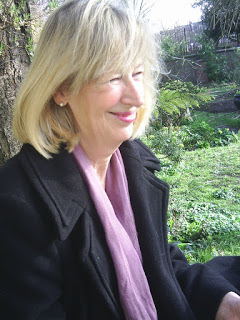
I ought to say a little bit about why I love the medieval period so much. It started when I was a small child and lived in what was really a medieval village with the church - built by the Black Prince, King Richard's father - at one end of the high street and the castle with its moat at the other. It doesn't need much imagination to make up stories about what might have happened in a place like that.
I gained an M.A. from the University of East Anglia and taught for the Open University on the Humanities Foundation course in subjects as diverse as history, philosophy, music and religion.
Since then I have written many plays and contemporary romances as well as the libretti for several chamber operas. I ran a lunchtime theatre in York above a medieval coaching inn, have written for street theatre groups and worked with installation artists on various projects.
Connect with Cassandra:
Website • Twitter • Facebook • Amazon Author Page.
Check out Anne Krist's fabulous book — Burning Bridges #Romance #GreatReads @DeeSKnight

Burning BridgesBy Anne Krist
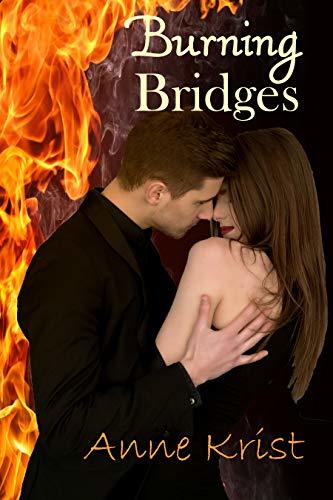
Consider the role of strangers in our lives. An unknown postman in Virginia hides a bag of mail one day. His simple action set in motion untold consequences for many others—strangers—all over the country. How many bridges were burned in that forgotten mail pouch?
Sara Richards’s world is rocked when three love letters from 1970 are delivered decades late. The letters were written by Paul Steinert, a young sailor who took her innocence with whispered words of love and promises of forever before leaving for Vietnam. Sara is left behind, broken hearted and secretly pregnant, yearning for letters she never received.
Then he died.
Now, years later, she discovers the betrayal wasn’t Paul’s, when her mother confesses to a sin that changed their lives forever. How can Sara reveal to Paul’s parents that they have a granddaughter they’ve missed the chance to know? Even worse, how will she find the words to tell her daughter that she’s lived her life in the shadow of a lie?
Picking her way through the minefields of distrust and betrayal, Sara finds that putting her life together again while crossing burning bridges will be the hardest thing she’s ever done.
The Coffee Pot Book Club
★★★★★
Highly Recommended
Read the full review HERE!

Pick up your copy of Burning Bridges Amazon UK • Amazon US
Anne Krist
 Anne Krist is the “sister” to erotic romance author Dee S. Knight. She is quieter, more reserved, and certainly more circumspect about S-E-X then her wild and crazy sibling. Thus she’s more comfortable writing sweet(er) romance, where there might be a few sensual scenes, but no more than that. One thing about Anne: she’s not more romantic than Dee. They both write happily ever after endings and share the solid belief that love can last forever and beyond!
Anne Krist is the “sister” to erotic romance author Dee S. Knight. She is quieter, more reserved, and certainly more circumspect about S-E-X then her wild and crazy sibling. Thus she’s more comfortable writing sweet(er) romance, where there might be a few sensual scenes, but no more than that. One thing about Anne: she’s not more romantic than Dee. They both write happily ever after endings and share the solid belief that love can last forever and beyond!Connect with Anne: Website • Facebook • Twitter.
August 11, 2020
Join #HistoricalFiction author, Paul Walker, as he explores what life was like in London for Italian philosopher, Giordano Bruno #History #Tudors

Life in the time of Giordano Bruno
(The London Years, 1583-1585)
By Paul Walker
Why include real people in historical fiction? A plot surrounding actual events with only fictional characters can be satisfying. But action played out with real and recognisable figures can add colour, interest and tether the fiction more securely in the period. At the other extreme, there are many outstanding novels based entirely on the lives of famous historical characters. That’s not my way of writing. In my books, although real people are encountered, the main protagonist is fictional, offering greater freedom with plot development.
So much for theory – in practice, it’s never that simple. In my experience, writing doesn’t follow meticulous planning. The book develops a life of its own, with events taking the story in unexpected directions and the personalities of real characters often veer away from the commonly accepted understanding (if there is one). I will admit to being liberal with the use of real characters in the William Constable series but would argue there is a purpose behind their inclusion.
William Constable is a fictional physician, mathematician, astronomer and reluctant agent for Sir Francis Walsingham, Spymaster for Elizabeth I. He has demonstrated expertise in astronomy by the invention of a navigational aid for ships sailing to the ‘New Lands’. (William’s device and its use by the explorers, John Hawkins and Humphrey Gilbert are described in books 1 and 2 in the series – State of Treason and A Necessary Killing.) Astronomy is the first reason for William to encounter Giordano Bruno in the third book in the series – The Queen’s Devil. Bruno was a defrocked Dominican Friar who travelled Europe and landed in London in 1583, lodging at the French Embassy. He was well known for his controversial views on an infinite universe and wrote some of his most significant works during his stay in England. But there’s more. In Giordano Bruno and the Embassy Affair, John Bossy makes a convincing case that Bruno acted as a spy for Walsingham. It was Bruno’s reports, under the pseudonym Henry Fagot, that led to Francis Throckmorton’s arrest
for treason by Walsingham. The Throckmorton conspiracy was one of the most important in Elizabeth’s reign, leading to the strict confinement of Mary Queen of Scots, the expulsion of the Spanish Ambassador and eventual war with Spain.

Giordano Bruno is the main protagonist in an excellent series of historical thrillers by S J Parris. When a historical character has been portrayed so well by another author, it’s a daunting prospect to include that character in your work. In the end, the temptation was too much; Bruno was such a fascinating figure that I shaped a significant role for him in The Queen’s Devil. William is an open-minded scholar and would have been likely to sympathise with Bruno’s theory of the universe, despite the general view that it was heretical. Also, as a fellow spy for Walsingham, Bruno could assist in freeing William from a dangerous entanglement in the Throckmorton conspiracy.
Bruno was born in 1548, and at the age of 17, he entered the Dominican order at a monastery in Naples. His inclination to free- thinking and forbidden books caused him difficulties and he fled to avoid an indictment being prepared against him in 1575. Bruno wandered Europe until, in 1583, he arrived in England as a guest of the French Ambassador, Michel de Castelnau. He was introduced to Sir Philip Sidney to whom he dedicated two books. Sidney accompanied Bruno on a visit to Oxford University where he debated and lectured on his controversial views. The visit to Oxford was not a success. He was mocked for his opinions, his accent and expressive way of oration. His support of the Copernican view of the heavens was criticised and, rather than the earth rotating, ‘... it was his own head which did run round, and his brains did not stand still.’ Bruno was offended at his reception, saying of the Oxford academics that they, ‘... look down their noses, laugh at you... fart with their lips.’

To comprehend the controversy and outrage caused by Bruno’s views, the state of astronomy in the sixteenth century should be understood. The Ptolemaic conception of the universe was still generally accepted in western Europe. Here, the earth was at the centre of a finite universe, around which the moon, sun and the five naked-eye planets circled. Outside this was another sphere containing fixed stars. Copernicus challenged this view in 1543, placing the sun in the centre and asserting that day and night were explained by the rotation of the earth rather than the heavens. But the Copernican model remained a closed system with an outer sphere of fixed stars. It was Bruno, not Copernicus, or even Galileo years after Bruno’s death, who conceived of an infinite universe containing suns with their own families of planets.
Bruno was not a mathematician and didn’t have the aid of telescopic observations for his theories. He relied upon logic and metaphysical arguments. What defines the limit of the universe? If the earth traverses the skies, why not the sun? Are the stars distant suns? His contention was not only that the universe was limitless; there were also infinite suns offering heat and light to other earths. He stated that these other worlds, ‘... have no less virtue, nor a nature different from that of our earth.’

Imagine how radical and outlandish these views must have appeared in sixteenth-century England, where deviation from the proscribed religion was regarded as heresy, and a physician could administer a poultice of boar’s grease wrapped in owl skin as a cure for gout. Bruno ignored the danger and continued to develop his theories. Some of Bruno’s writings and tactless language eventually lost him the support of friends, and in 1585 he returned to France with Michel de Castelnau.

Giordano Bruno lived at the wrong time. Fifty years before his birth or fifty years after his death, his outspoken views may have been tolerated by the church and received proper acknowledgement by scholars. But at the end of the sixteenth century, the Inquisition was in full force. Bruno was confined in prison in Rome for seven years before being stripped naked, gagged and burned at the stake on 17 February 1600. A sad end to a visionary – and an Elizabethan spy.
The Queen’s Devil
(William Constable Spy Thriller, Book #3)
By Paul Walker
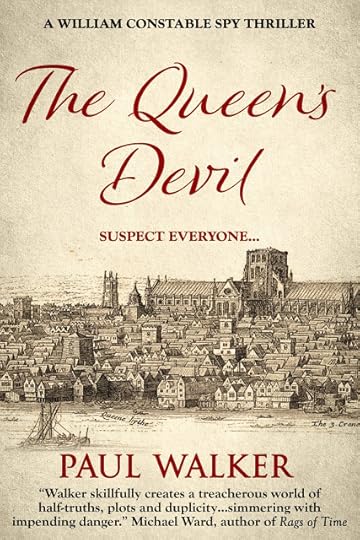
1583.
William Constable, recently married astrologer and mathematician, has settled into routine work as a physician when he is requested to attend two prisoners in the Tower of London. Both are accused of separate acts treason, but their backgrounds suggest there may be a connection.
Sir Francis Walsingham and Lord Burghley urge William to discover further intelligence from the prisoners while tending their injuries from torture.
The agent's investigations lead him to the French Embassy, which lies at the heart of a conspiracy which threatens the nation.
Through his enquiries, an unsuspecting William becomes entangled in a perilous web of politicking and religious fervour.
The threat comes from one the most powerful men in the English court – one referred to as the Queen’s Devil.
William faces a race against time to unpick these ties, climaxing in a daring raid on the Embassy.
Praise for Paul Walker
“Walker skilfully creates a treacherous world of half-truths, plots and duplicity... simmering with impending danger.”
Michael Ward, author of Rags of Time.
"A gripping and evocative page-turner that vibrantly brings Elizabeth's London to life."
Steven Veerapen, author of A Dangerous Trade.
"Full of convincing characters both historical and imagined."
Peter Tonkin
Pick up your copy of
The Queen’s Devil
Read for FREE with #KindleUnlimited subscription.
Paul Walker

Paul is married and lives in a village 30 miles north of London. Having worked in universities and run his own business, he is now a full-time writer of fiction and part-time director of an education trust. His writing in a garden shed is regularly disrupted by children and a growing number of grandchildren and dogs.
Paul writes historical fiction. He inherited his love of British history and historical fiction from his mother, who was an avid member of Richard III Society. The William Constable series of historical thrillers is based around real characters and events in the late sixteenth century. The first two books in the series - State of Treason and A Necessary Killing - were published in 2019. The third book, titled The Queen's Devil, was published in the summer of 2020.
Connect with Paul:
Twitter • Facebook • Amazon Author Page.
Pick up your #FREE copy of A Single Step by Georgia Rose #Romance #Contemporary @GeorgiaRoseBook

A Single Step
By Georgia Rose
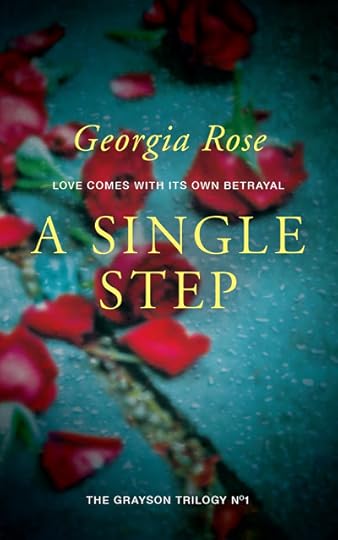
A woman wracked with grief. A man with a troubled past. Will trust build a bridge between them or will it be destroyed by dark secrets?
Shattered by her daughter's death and tormented by her husband's infidelity, Emma Grayson seeks refuge in solitude. As she slowly re-enters the real world, she takes on work at the sprawling Melton Estate’s stables. Initially distracted by her painful healing process, she realizes that the property’s handsome manager carries his own sadness…
When Emma is thrown from her horse and badly injured, Trent provides tender, selfless care. She doesn’t want to appear ungrateful for the lonely ex-RAF man’s support, but her anxiety keeps her silent. After his secretive past surfaces and events take a dramatic turn at the estate, she can't help but feel violently unsaddled all over again.
Will Emma ever find inner peace and love again, or is she destined to live with only heartache and pain?
A Single Step is the first book in the Grayson Trilogy, a dark romantic suspense series. If you like wounded characters, slow-building romance, and page-turning twists, then you'll love Georgia Rose’s powerful novel.
Georgia Rose

Georgia Rose is a writer and the author of the romantic and suspenseful Grayson Trilogy books: A Single Step, Before the Dawn and Thicker than Water. Following completion of the trilogy she was asked for more and so wrote a short story, The Joker, which is based on a favourite character from the series and the eBook is available to download for free at the retailer of your choice.
Her fourth novel, Parallel Lies, encompasses crime along with Georgia’s usual blending of genre and its sequel, Loving Vengeance, has now completed The Ross Duology.
Georgia’s background in countryside living, riding, instructing and working with horses has provided the knowledge needed for some of her storylines; the others are a product of her passion for people watching and her overactive imagination.
Following a long stint working in the law Georgia set up her own business providing administration services for other companies which she does to this day managing to entwine that work along with her writing.
Her busy life is set in a tranquil part of rural Cambridgeshire in the UK where she lives with her much neglected husband and dog.
Connect with Georgia:
Check out Daniel Greene's fabulous book — Northern Wolf (Northern Wolf #1) #HistoricalFiction #AmericanCivilWar

Northern Wolf(Northern Wolf #1)By Daniel Greene

A broken man will be forged in the flames of war...
It is late 1862, and the United States has been ripped apart by civil war for over a year with no end in sight. The war is a distant thought to Johannes Wolf, a young German immigrant with a crippled leg keeping him off the muster lists.
Desperately dredging the gutters for recruits, Wolf cons his way into the depleted, demoralized, and poorly run Union army, and is promptly placed in the undesirable F Company of the 13th Michigan Cavalry.
Wolf's company find themselves riding with Custer and the Michigan Brigade on a collision course with master horseman J.E.B. Stuart and the Army of Northern Virginia in a small town in Pennsylvania, called Gettysburg.
Will they stand tall against the knights of the South and prove themselves worthy? Or will they fall beneath screaming bullets and sweeping blades, becoming more bloody fodder for a lost cause?
The Coffee Pot Book Club
★★★★★
Highly Recommended
Read the full review HERE!

Pick up your copy ofNorthern WolfAmazon UK • Amazon US
Daniel Greene
 Daniel is an award-winning and best-selling multi-genre author. He made his debut in the post-apocalyptic genre and quickly became known as a must read with his award-winning and best-selling hit The End Time Saga. His deep passion for history has inspired him to tackle the historical fiction genre with launch of the best-selling Northern Wolf Series.
Daniel is an award-winning and best-selling multi-genre author. He made his debut in the post-apocalyptic genre and quickly became known as a must read with his award-winning and best-selling hit The End Time Saga. His deep passion for history has inspired him to tackle the historical fiction genre with launch of the best-selling Northern Wolf Series.He is an avid traveler and physical fitness enthusiast. He fulfilled a quest of iron by worshipping at the shrine of Arnold Schwarzenegger, in Graz, Austria, an experience he will never forget. If he isn’t working on his next book, you can find him training to survive the impending rise of the dead.
He is a proud member of the Horror Writers Association and the Historical Novel Society. Although a Midwesterner for life, he’s lived long enough in Virginia to call it home.
Connect with Daniel: Website • Facebook • Goodreads.
Welcome to Day #5 of the blog tour for The Last King #BlogTour #CoffeePotBookClub #TheLastKing @JudithArnopp @coloursofunison
The Last King: England: The First Viking Age
(The Ninth Century Book 1)
By M J Porter

They sent three hundred warriors to kill one man. It wasn’t enough.
Mercia lies broken but not beaten, her alliance with Wessex in tatters.
Coelwulf, a fierce and bloody warrior, hears whispers that Mercia has been betrayed from his home in the west. He fears no man, especially not the Vikings sent to hunt him down.
To discover the truth of the rumours he hears, Coelwulf must travel to the heart of Mercia, and what he finds there will determine the fate of Mercia, as well as his own.
Today we are stopping over at The Road to Hastings and Other Stories... where M J Porter is talking about the challenges in researching Ninth Century Mercia.
Click HERE!
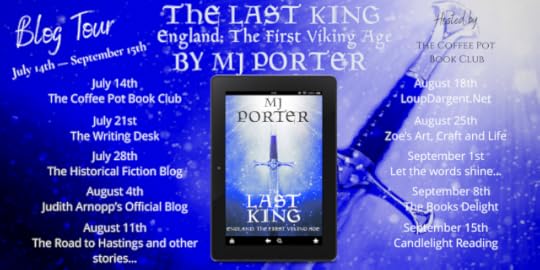
August 10, 2020
Matthew Harffy is sharing an excerpt from his fabulous #NewRelease Fortress of Fury (Book 7 of the Bernicia Chronicles) #HistoricalFiction #DarkAges @MatthewHarffy

Fortress of Fury
Book 7 of the Bernicia Chronicles
By Matthew Harffy

\
Beobrand is besieged in the action-packed instalment in the Bernicia Chronicles set in AD 647 Anglo-Saxon Britain.
War hangs heavy in the hot summer air as Penda of Mercia and his allies march into the north. Caught unawares, the Bernician forces are besieged within the great fortress of Bebbanburg.
It falls to Beobrand to mount the defence of the stronghold, but even while the battle rages, old and powerful enemies have mobilised against him, seeking vengeance for past events.
As the Mercian forces tighten their grip and unknown killers close in, Beobrand finds himself in a struggle with conflicting oaths and the dreadful pull of a forbidden love that threatens to destroy everything he holds dear.
With the future of Northumbria in jeopardy, will Beobrand be able to withstand the powers that beset him and find a path to victory against all the odds?
Excerpt
Prologue
EOFERWIC, AD 646
Beobrand was yet some way from his destination, but he halted his progress, holding himself still and silent in the darkness. His hand fell to the antler hilt of the seax that hung sheathed from his belt. Perhaps Coenred had been right. Maybe he should not have ventured out alone into the cool night-time shadows of the muddy streets of the walled settlement.
But surely he was safe here, in the heart of Deira’s capital. He listened for a long while, feeling foolish for his nervousness. Curse Coenred and his anxiety. The young monk had sown the seeds of fear in his mind and now every shadow held an imagined lurking danger.
A baby wailed, the sound thin and plaintive in the distance. All else was silent. The night was dry and, looking up, there were no clouds to cover the sharp, cold light of the stars and the curved bright blade of the rising moon.
Shaking his head at his own temerity, he pressed on. Much had changed in Eoferwic these last years, with new buildings being erected and old Roman ruins being repaired and returned to some semblance of their former glory. Some of the houses he passed were unfamiliar to him, but he knew the way well enough.
He would be at the church soon, and his heart quickened at the prospect of being alone with her, even if just for a few moments. Ever since that evening the week before he had scarcely been able to think of anything else. Her soft hair and the pliant lips that had brushed his filled his mind, blurring the rest of his thoughts behind the heat and brilliance of their memory.
When the message had arrived earlier that evening, Beobrand had struggled to appear uninterested. The missive had been brought by a hooded man, who slipped back into the darkness as soon as he handed the scrip of velum to Attor who was guarding the door. The wiry warrior had brought the note to Beobrand. They had peered at the scratchings on the stretched calfskin by the light of the candles in the hall, but neither Beobrand nor any of his gesithas knew how to read the markings that were usually penned by monks and priests. So he had sent for Coenred, who had been able to decipher the meaning of the words easily.
“It is Latin,” he had said, running his finger over the smooth sheet of vellum. “The writing is clear, the letters well-formed.”
Beobrand had not wished to know the quality of the penmanship. He had already decided who must have sent the message. She knew how to write and would have surmised he would turn to Coenred to explain the note’s meaning. And they both knew that Coenred would keep their secret; that he would be discreet.
Beobrand still harboured a simmering rage at Coenred for stumbling upon them the week before. He felt his face grow hot at the memory. Who knew what that night might have held in store if the young monk had not blundered into that quiet corner of the newly built monastery at Hereteu? But in helping them meet secretly this night, Coenred could redeem himself. After all, it had been an accident back in Hereteu, happenstance that had seen them interrupted by the monk after the briefest embrace.
“What does the message say?” Beobrand had asked, his words coming breathlessly, such was his excitement. He could hardly believe how she made him feel. He was as giddy as a child thinking of her. He had pushed thoughts of her deep down within himself for a long time. Years. But all of his passion and longing had resurfaced, the flames of his desire rekindled by the merest brush of her lips and a warm whisper in his ear.
Coenred had looked at him, a strange expression on his slender face. His delicate fingers had stroked the vellum, flattening it unconsciously as he stared at Beobrand.
“The words are simple enough, old friend,” he’d said. Meet at the church at moonrise. Come alone.
Joy had flooded through Beobrand. It was already dark and the moon would be up soon. He’d turned to leave, but Coenred had pulled him back, his slender fingers tugging at the woollen sleeve of his kirtle.
“Beo,” he’d whispered urgently, “do not do this thing. Think of the kingdom if nothing else. Even if you care nought for your own life, think of her. Think of her son… The king’s wrath will destroy you, should he find out what is between you.”
The young monk had been pale in the flickering light of the candles, his eyes glistening. Beobrand had shrugged off his grip and wheeled on him, anger rising. What did Coenred know of how he felt? It had been so many years since he had dared to feel anything like this. A small voice whispered within him that this was madness, that his friend was right. But Beobrand would not listen. He could not forget the scent of her, the lingering touch of her lips. He would not ignore the chance to be alone with her now.
“But nobody else knows of this apart from you,” he’d said, his voice a harsh whisper, as threatening as a blade being rasped over a whetstone. “So the king will not find out. Will he?” He’d fixed Coenred with a baleful glower. “Or are you planning on telling him?”
He was almost at the church now. The newly built stone structure was surrounded by open ground. He would be able to see its bulk when he rounded the next corner, but again, something made him hesitate. He stopped once more, breathing silently through his mouth. There was no sound. No wind stirred. The distant infant’s crying had ceased. So what caused his neck to prickle so? Could Coenred have been right? He had urged Beobrand not to go, or at least to take some of his men with him. “It could be a trap,” he’d said.
Beobrand had dismissed the younger man’s fears. Who else would have written the message to him, if not her? Few people could write and who, save for her, would believe that he would be able to find someone to read such a message?
And yet, like an animal sensing unseen hunters, Beobrand’s muscles tensed and bunched, ready for action. He was not so blinded by his lust that he could ignore his instincts; they had kept him alive for too long. He sniffed the air, but could smell nothing save the shit-stink of the mud-slicked streets. Cautiously now, he edged his way forward, keeping his left side close to the wall of the building he was passing.
He paused and listened.
Was that the whisper of a voice ahead? He could not be certain. Fingers of dread scratched down his back and he suppressed a shiver. He was sure of it now, there was danger out there in the darkness.
Silently, he slid his seax from its sheath, wishing now that he had listened to Coenred. He had slipped out alone from the hall where they were staying. Cynan, the tall, trusted Waelisc gesith, had questioned where he was going, rising to his feet as if to follow, but Beobrand had waved him away.
“Can’t a man piss in peace?” he’d answered and vanished into the night.
Gods, he was a fool. Alone and with nothing more than a seax to defend him should it come to a fight. Still, he was a match for any man who was stupid enough to attempt to steal his purse. Taking a deep breath, he stepped out from the shadows between the buildings and into the open area before the church. The moon had risen above the shingled roof and the night seemed almost bright after the deep shadows of the sheltered streets.
Beobrand swept his gaze around the cleared ground. The entrances to streets yawned black as raven’s beaks. Nothing moved. He could see no sign of her, or anyone else, near the church. How had he been so foolish? To think she would have come alone, into the dark streets of Eoferwic. He should turn away now, head back to the warmth of the hall and the camaraderie of his men. But instead, he stepped into the silvered moonlight, making his way towards the church. If there was even the slightest chance she might be there, he could not leave.
He sighed resignedly when the men stepped out from the shadowed lee of the building. He was unsurprised, though he knew not who they were. Still, he had many enemies and he should have known better than to trust that his wyrd would allow him to find happiness in a secret nocturnal tryst. Cursing himself silently for a fool, he rolled his head, loosening the neck muscles. A pitiful sense of disappointment washed over him, but as quickly as it came, it was smothered by a searing fury. He had come here seeking a love he knew was forbidden to him, a connection he had only dreamt of, but now he faced unnamed assailants in the night. Death and blood were all he would find here.
Pick up your copy of
Fortress of Fury
Catch up with the rest of the series for FREE with #KindleUnlimited Subscription.
 The Serpent Sword (The Bernicia Chronicles Book 1) The Cross and the Curse (The Bernicia Chronicles Book 2) Blood and Blade (The Bernicia Chronicles Book 3)Killer of Kings (The Bernicia Chronicles Book 4)Warrior of Woden (The Bernicia Chronicles Book 5) Storm of Steel (The Bernicia Chronicles Book 6) Add The Bernicia Chronicles to your ‘to-read’ list on
The Serpent Sword (The Bernicia Chronicles Book 1) The Cross and the Curse (The Bernicia Chronicles Book 2) Blood and Blade (The Bernicia Chronicles Book 3)Killer of Kings (The Bernicia Chronicles Book 4)Warrior of Woden (The Bernicia Chronicles Book 5) Storm of Steel (The Bernicia Chronicles Book 6) Add The Bernicia Chronicles to your ‘to-read’ list on
 GoodreadsOther books by Matthew HarffyA Time For SwordsWolf of Wessex
GoodreadsOther books by Matthew HarffyA Time For SwordsWolf of Wessex
Matthew Harffy
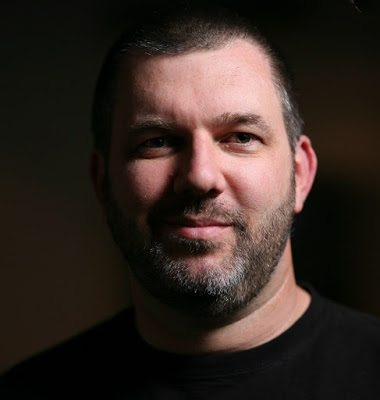
Matthew Harffy lived in Northumberland as a child and the area had a great impact on him. The rugged terrain, ruined castles and rocky coastline made it easy to imagine the past. Decades later, a documentary about Northumbria's Golden Age sowed the kernel of an idea for a series of historical fiction novels. The first of them is the action-packed tale of vengeance and coming of age, THE SERPENT SWORD.
Matthew has worked in the IT industry, where he spent all day writing and editing, just not the words that most interested him. Prior to that he worked in Spain as an English teacher and translator. Matthew lives in Wiltshire, England, with his wife and their two daughters.
Connect with Matthew:
Website • TV Series Website • Facebook • Twitter.
Check out Annette Hannah's fabulous #NewRelease — Wedding Bells at the Signal Box Cafe #Romance @AnnetteHannah

Wedding Bells at the Signal Box Cafe
By Annette Hannah

Here comes the bride...
Lucy Woods has always dreamed of running her very own wedding venue. After moving her eight-year-old son to the countryside she's surprised to find the perfect location and her best friend, Abbie, eager to help make that dream a reality! Too bad Abbie's older brother Dominic isn't keen on Lucy or their big idea!
As a divorce lawyer Dominic doesn't believe in love at first sight or wedding vows, he's seen them broken more times than he can count. But when Lucy arrives back in town, his hardened heart begins to crack.
Making her dream come true is a huge undertaking, but Lucy knows that The Signal Box Café is her chance to finally make something of her life. If only the irritating (and oh-so-gorgeous) Dom didn't make her imagine wearing a white dress and walking down the aisle...
Can Lucy and Dominic find a way to each other this summer or will the wedding bells chime for another couple?
Praise for Wedding Bells at the
Signal Box Café
'Brimming with friendship and romance, this lovely book will charm your heart.'
Milly Johnson, Sunday Times Bestselling author.
Pick up your copy of
Wedding Bells at the Signal Box Cafe
Add Wedding Bells at the Signal Box Cafe to your ‘to-read’ list on

Annette Hannah
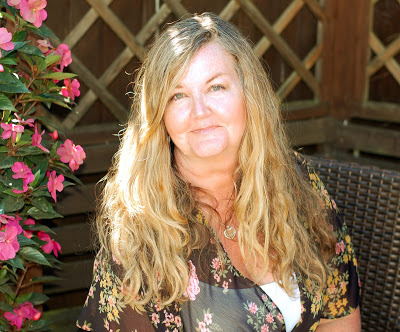
Annette Hannah is a Liver Bird who relocated to leafy Hertfordshire in the 80's and now lives near a river with her husband, two of their three grown up children and a crazy black cocker spaniel. She writes Romantic novels in settings inspired by the beautiful countryside around her and always with a nod to her hometown.
Connect with Annette:
Website • Twitter • Facebook • Instagram.
Check out Gretchen Jeannette's fabulous book — This Day is Ours

This Day is OursBy Gretchen Jeannette

Love is like war: easy to begin but very hard to end.
The American Colonies, 1776.
As the flames of revolution spread across a divided land, a shadowy figure prowls the city of Philadelphia. Known only as Jack Flash, rebel highwayman, he preys on wealthy aristocrats loyal to the British Crown. The unpredictable outlaw always manages to stay one step ahead of his foes. Until the night he targets a Loyalist lady whose fiery spirit could spell his doom.
Alexandra Pennington believes she has her future well planned when a chance encounter turns her world upside down. Betrothed to a dashing king's man suited to her in every way, the young widow becomes entangled with an unrefined rebel fiercely opposed to British rule. Against all reason, she finds common ground with an enemy of the Crown. The sensible course for her is clear, but her bond with the notorious rogue will test her loyalty not only to her king but also to the man she vowed to marry.
From the drawing rooms of Philadelphia to the battlefields of an emerging nation, one woman stands between two men fighting for love and honor in a war destined to change all their lives forever.
The Coffee Pot Book Club
★★★★★
Highly Recommended
Read the full review HERE!

Pick up your copy ofThe Day is OursAmazon UK • Amazon US
Gretchen Jeannette
 Gretchen Jeannette was born in 1955 in Wilmington, Delaware. She lives and works in Chester County, Pennsylvania, an area rich in Revolutionary War and Colonial American history. Her enduring interest in 18th Century America began at a young age, inspired by the novels of Dale Van Every and Allan Eckert, whose timeless tales of adventure and romance capture the essence of early American lore. Eager to read more such stories, to her disappointment she had trouble finding them on bookshelves, so she decided to write one of her own. Thus began a journey fueled by her passion for breathing life into history through believable characters, authentic historical details, and plots woven with adventure, romance and suspense.
Gretchen Jeannette was born in 1955 in Wilmington, Delaware. She lives and works in Chester County, Pennsylvania, an area rich in Revolutionary War and Colonial American history. Her enduring interest in 18th Century America began at a young age, inspired by the novels of Dale Van Every and Allan Eckert, whose timeless tales of adventure and romance capture the essence of early American lore. Eager to read more such stories, to her disappointment she had trouble finding them on bookshelves, so she decided to write one of her own. Thus began a journey fueled by her passion for breathing life into history through believable characters, authentic historical details, and plots woven with adventure, romance and suspense.Connect with Gretchen: Website • Twitter • Goodreads.
The Coffee Pot Book Club
...more
- Mary Anne Yarde's profile
- 159 followers


